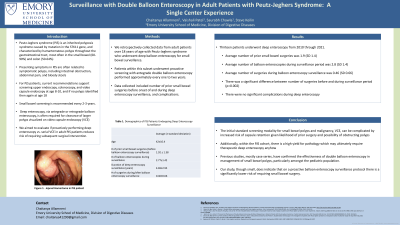Back


Poster Session C - Monday Afternoon
Category: Small Intestine
C0635 - Surveillance With Double Balloon Enteroscopy in Adult Patients With Peutz-Jeghers Syndrome: A Single Center Experience
Monday, October 24, 2022
3:00 PM – 5:00 PM ET
Location: Crown Ballroom

Has Audio
- CA
Chaitanya Allamneni, MD
Emory University Hospital
Decatur, GA
Presenting Author(s)
Chaitanya Allamneni, MD1, Vaishali Patel, MD2, Saurabh Chawla, MD2, Steven Keilin, MD2
1Emory University Hospital, Decatur, GA; 2Emory University School of Medicine, Atlanta, GA
Introduction: Peutz-Jeghers syndrome (PJS) is an inherited polyposis syndrome caused by mutation in the STK11 gene, and characterized by hamartomatous polyps throughout the gastrointestinal tract, most often in the small bowel (60-90%) and colon (50-64%). Presenting symptoms in PJS are often related to symptomatic polyps, including intestinal obstruction, abdominal pain, and bloody stools. For PJS patients, current recommendations support screening upper endoscopy, colonoscopy, and video capsule endoscopy at age 8-10, and if no polyps identified then again at age 18. Small bowel screening is recommended every 2-3 years. Deep enteroscopy, via antegrade or retrograde balloon enteroscopy, is often required for clearance of larger polyps visualized on video capsule endoscopy (VCE). The optimal follow-up strategy and modality of screening and surveillance of small bowel polyps is controversial. We aimed to evaluate if proactively performing deep enteroscopy vs. serial VCE in adult PJS patients reduces risk of requiring subsequent surgical intervention.
Methods: We retrospectively collected data from adult patients over 18 years of age with Peutz-Jeghers syndrome who underwent deep balloon enteroscopy for small bowel surveillance. Patients within this subset underwent proactive screening with antegrade double balloon enteroscopy performed approximately every one to two years. Data collected included number of prior small bowel surgeries before onset of and during deep enteroscopy surveillance, and complications.
Results: Thirteen patients underwent deep enteroscopy from 2010 through 2021. Average number of prior small bowel surgeries was 1.9 (SD 1.4), average number of balloon enteroscopies during surveillance period 2.8 (SD 1.4), and average number of surgeries during balloon enteroscopy surveillance 0.46 (SD 0.66). There was a significant difference between number of surgeries before and during surveillance period (p=0.002)
Discussion: The initial standard screening modality for small bowel polyps and malignancy, VCE, can be complicated by increased risk of capsule retention given likelihood of prior surgery and possibility of obstructing polyps. Additionally, within the PJS cohort, there is a high yield for pathology which may ultimately require therapeutic deep enteroscopy anyhow. Our study, though small, does indicate that on a proactive balloon enteroscopy surveillance protocol there is a significantly lower risk of requiring small bowel surgery.
Disclosures:
Chaitanya Allamneni, MD1, Vaishali Patel, MD2, Saurabh Chawla, MD2, Steven Keilin, MD2. C0635 - Surveillance With Double Balloon Enteroscopy in Adult Patients With Peutz-Jeghers Syndrome: A Single Center Experience, ACG 2022 Annual Scientific Meeting Abstracts. Charlotte, NC: American College of Gastroenterology.
1Emory University Hospital, Decatur, GA; 2Emory University School of Medicine, Atlanta, GA
Introduction: Peutz-Jeghers syndrome (PJS) is an inherited polyposis syndrome caused by mutation in the STK11 gene, and characterized by hamartomatous polyps throughout the gastrointestinal tract, most often in the small bowel (60-90%) and colon (50-64%). Presenting symptoms in PJS are often related to symptomatic polyps, including intestinal obstruction, abdominal pain, and bloody stools. For PJS patients, current recommendations support screening upper endoscopy, colonoscopy, and video capsule endoscopy at age 8-10, and if no polyps identified then again at age 18. Small bowel screening is recommended every 2-3 years. Deep enteroscopy, via antegrade or retrograde balloon enteroscopy, is often required for clearance of larger polyps visualized on video capsule endoscopy (VCE). The optimal follow-up strategy and modality of screening and surveillance of small bowel polyps is controversial. We aimed to evaluate if proactively performing deep enteroscopy vs. serial VCE in adult PJS patients reduces risk of requiring subsequent surgical intervention.
Methods: We retrospectively collected data from adult patients over 18 years of age with Peutz-Jeghers syndrome who underwent deep balloon enteroscopy for small bowel surveillance. Patients within this subset underwent proactive screening with antegrade double balloon enteroscopy performed approximately every one to two years. Data collected included number of prior small bowel surgeries before onset of and during deep enteroscopy surveillance, and complications.
Results: Thirteen patients underwent deep enteroscopy from 2010 through 2021. Average number of prior small bowel surgeries was 1.9 (SD 1.4), average number of balloon enteroscopies during surveillance period 2.8 (SD 1.4), and average number of surgeries during balloon enteroscopy surveillance 0.46 (SD 0.66). There was a significant difference between number of surgeries before and during surveillance period (p=0.002)
Discussion: The initial standard screening modality for small bowel polyps and malignancy, VCE, can be complicated by increased risk of capsule retention given likelihood of prior surgery and possibility of obstructing polyps. Additionally, within the PJS cohort, there is a high yield for pathology which may ultimately require therapeutic deep enteroscopy anyhow. Our study, though small, does indicate that on a proactive balloon enteroscopy surveillance protocol there is a significantly lower risk of requiring small bowel surgery.
Disclosures:
Chaitanya Allamneni indicated no relevant financial relationships.
Vaishali Patel indicated no relevant financial relationships.
Saurabh Chawla indicated no relevant financial relationships.
Steven Keilin indicated no relevant financial relationships.
Chaitanya Allamneni, MD1, Vaishali Patel, MD2, Saurabh Chawla, MD2, Steven Keilin, MD2. C0635 - Surveillance With Double Balloon Enteroscopy in Adult Patients With Peutz-Jeghers Syndrome: A Single Center Experience, ACG 2022 Annual Scientific Meeting Abstracts. Charlotte, NC: American College of Gastroenterology.
